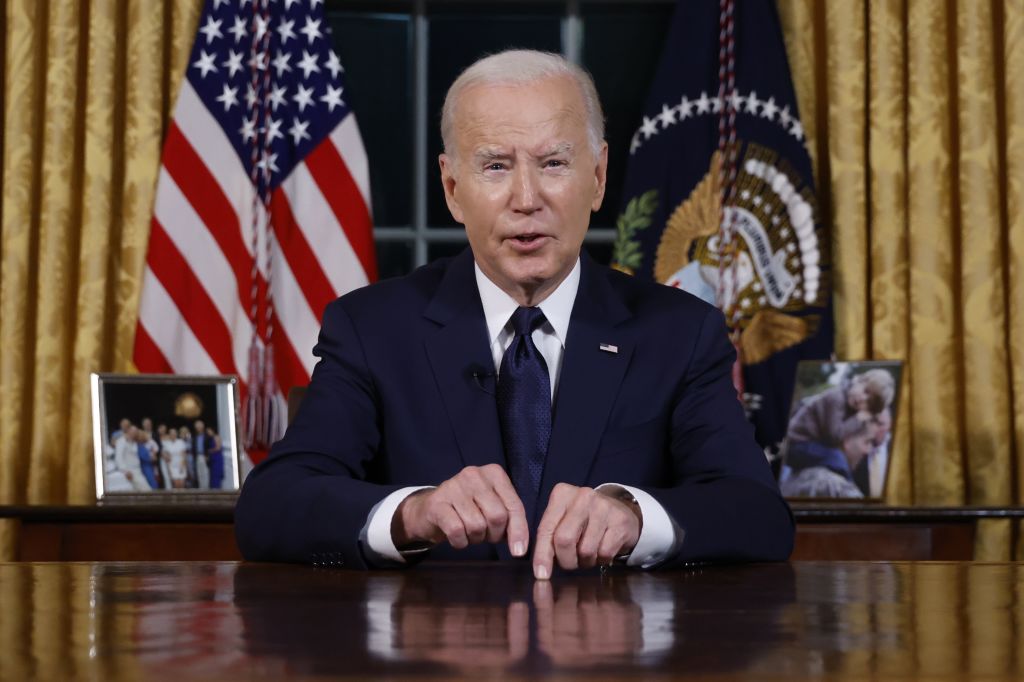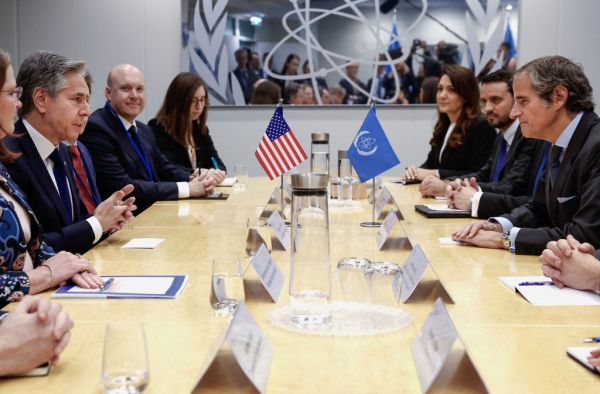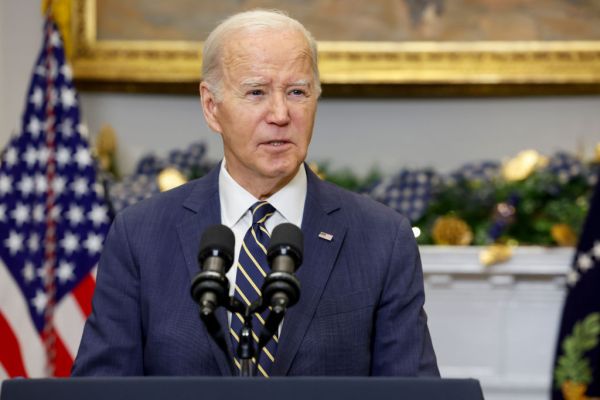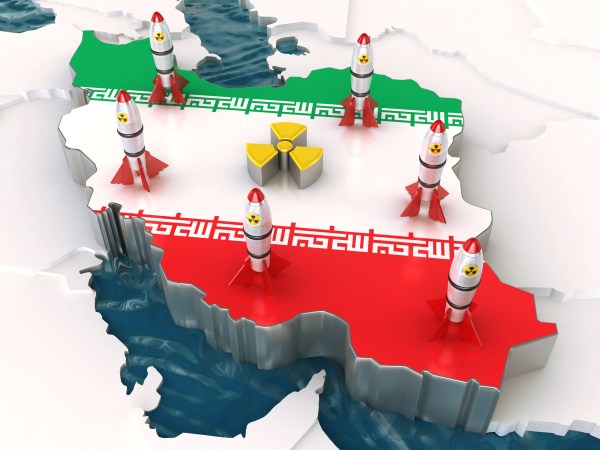Last week Deputy Treasury Secretary Wally Adeyemo reportedly told House Democrats that the $6 billion ransom the Biden administration agreed to send Iran—oil payments that had been frozen in South Korea and released to Qatar—ostensibly to secure the release of five American-Iranian dual nationals had been refrozen. The action was provoked, the story suggested, by Tehran’s long-standing support of Hamas, which invaded Israel on October 7, killing and kidnapping with abandon. Among the dead and kidnapped are Americans.
The Islamic Republic is denying that the Qatar funds have been locked. Iranian state media even reported that Qatar’s central bank governor had said, “The rumors about the refreezing of Iran’s funds in Qatari banks were of no real value, and were more like a joke and media game.” John Kirby, the U.S. national security council spokesman, hasn’t answered the question explicitly, though he told The Dispatch “none of it has been spent or accessed by Iranian authorities, and we’re watching it very closely.” Secretary of State Antony Blinken echoed the same line, also not clearly stating that the dollars had been refrozen but implying that Iran hadn’t been allowed to spend a cent.
One can see why the administration is being opaque. First, and perhaps foremost, if a senior U.S. official acknowledges that Iran was directly involved with the murder and kidnapping of U.S. citizens, that could be seen as a slippery slope casus belli. The White House, like the Israeli government, does not want to see this war expand into a regional conflagration. Directly acknowledging Iran’s collaboration in directing this war, or just being a co-director, could definitely ramp up emotions on all sides. Better to play down anything that might be catalytic.
And if the Biden administration has actually refrozen the accounts in Qatar—Ademeyo is known for being meticulous and careful in his use of English—it has effectively abandoned the approach it has taken on Iran since January 2021. Nonproliferation is the be-all and end-all of its Iran policy. The ransom payment was clearly a means to create the right ambience for Tehran to accept a new “understanding,” the beginning of a pay-as-you-go nuclear deal which just might delay an Iranian nuclear test, at least beyond November 2024. Whether Iran could pull off a test in the next year is doubtful, but U.S. officials are giving shorter timelines on how long it would take the Islamic Republic to construct an atomic device.
Unfortunately for the administration, Iran’s supreme leader, Ali Khamenei, has repeatedly stated that since Donald Trump withdrew the United States from Obama’s accord—the Joint Comprehensive Plan of Action—America simply cannot be trusted. (To be fair, Khamenei thought this way when he allowed his foreign minister, Mohammad Javad Zarif, to accept the agreement in 2015.) Refreezing the funds guarantees that Tehran won’t indulge the recurring American illusion that creating the right atmosphere might get the Islamic Republic in the right mood to have further indirect talks about the possibility that Tehran might cut its growing stockpile of highly enriched uranium. America has proven itself to be a fickle fiduciary.
The Democrats’ attachment to nonproliferation has, of course, weathered slaughter before. When Barack Obama’s administration kicked its nuclear diplomacy into high gear, Iran’s Islamic Revolutionary Guard Corps was on the ground in Syria directly abetting the killing of hundreds of thousands of Sunni Syrians who’d rebelled against the dictatorship of Bashar al-Assad, an Iranian and Russian ally. The murder of Syrian women and children, some through the use of poison gas, didn’t faze Obama’s Iran team. It kept its eye on a nuclear accord which, the administration reasoned, would make Iran’s problematic nature and its capacity to inflict harm less menacing—and might even lead to regime evolution through more commerce. The Chinese and Russian models—economic growth enervating darker, more aggressive impulses—then had, and may still have, currency in the Democratic Party.
During the worst of the Syrian bloodletting, the White House blamed most of the killing and forced mass migration to Turkey and Europe on Russia and the Assad regime, showing clearly that Iranian complicity was, nonetheless, a touchy issue. Killing Israeli civilians, however, even if the numbers are exponentially smaller, would be much more challenging for the administration to overcome, in part because the viral videos captured by Hamas attackers and Israelis are so intimate, graphic, and, for Hamas’ holy warriors, enjoyable. Biden National Security Adviser Jake Sullivan has already described Iran as “complicit” in Hamas’ attack, even if the administration is trying hard to be punctilious about whether U.S. intelligence can show that Tehran co-planned the assault. For both American and European audiences, given Western history, killing Jews is much worse than killing Syrians. Even if one assumes that anger over Iran’s complicity in Hamas’ attacks and the horror of 1,300 dead Israelis will fade as the Palestinian death count skyrockets in an Israeli ground assault on Gaza, this likely won’t make it any easier for the Biden administration to return to past practices and unfreeze the Qatari-held funds.
They might try to do so as November 2024 gets closer, but it most likely will be too late. The cost of the Hamas-Israel war will be immense. Iran’s villainy is likely to linger enough to make it too uncomfortable for too many Democrats, perhaps even in the White House, to tolerate giving billions to Tehran, even for “humanitarian purposes.” Sanctions relief for nuclear restraint—not that long ago a mainstay for the Washington foreign-policy establishment, even among Republicans who supported nuclear negotiations—will be dead as a doornail. What should have been apparent to all from the beginning might now be more openly and honestly discussed: The Iranian regime hasn’t come all this way, over four decades, not to build a bomb. The Israeli air force and American aircraft-carrier battle groups, which are now in or headed toward the eastern Mediterranean, are for the ruling clergy and the Islamic Revolutionary Guards just less intimidating once the theocracy goes nuclear.
So let us assume that the Qatar funds are frozen. What happens next? Perhaps not much. Iran policy could shift from appeasement to nuclear acceptance quietly. The Biden administration more or less conceded the clerical regime the nuke when it came into office: Iran’s highly enriched uranium stockpile significantly grew, more advanced centrifuges came online, and the White House more ardently tried to negotiate while downplaying the military option. Imagining scenarios where the White House would have sufficiently accurate information in a timely fashion to know that Khamenei had given the order to construct an atomic device—the standard that senior administration officials sometimes use as the only red line for a preventive strike—is, given past U.S. intelligence failures in detecting others building bombs, surreal. Would President Biden, who has decried “forever wars” in the Middle East, launch an air campaign that his admirals and generals will war-game out into a much broader conflagration in the Persian Gulf?
It is possible that events—the realization that the Islamic Republic’s malevolence isn’t fading and won’t be transmuted by more oil wealth and trade—will force the Biden administration to rethink everything about Iran. This would be, at least intellectually, a major change. It might not lead to a renaissance of sanctions, which is what many on the right want, since the administration hasn’t yet figured out what it’s going to do about China. And as long as the Middle Kingdom is able and willing to ignore U.S. sanctions on Iran’s oil trade, Beijing can severely limit the effectiveness of those measures. If Washington can first answer the trade-war question about China policy, then it might be able to better answer what it can do against Iran.
But if nonproliferation is dead as a polarizing cause, Washington could at least start having bipartisan, slightly less acrimonious conversations about the Islamic Republic. And given the drift of the Republican Party toward noninterventionism or an Asia First policy—which essentially means, vis-à-vis the Middle East, that Washington does its best to ignore the place while it readies or pretends to ready the Republican Party for the coming battle with China—this change might actually help Democrats more than Republicans.
Thanks to Vladimir Putin’s war to annihilate Ukraine, liberal internationalism has had a rebirth on the left. It would be premature to call it a muscular rebirth, and Democrats’ addiction to welfare spending, entitlements, and debt has shaped their foreign inclinations and reluctance to spend more on defense. The more muscular the U.S. military is, the more you can send it abroad to intervene. (MAGA Republicans are increasingly seeing defense spending similarly; the distance between Tucker Carlson and Alexandria Ocasio-Cortez shrinks.)
But the Hamas-Israel war will surely be clarifying for the Democrats as the Israel-suspicious side of the party—those who fear that Israel’s liberalism is in steep decline and likely cannot address the Palestinian conundrum through a two-state or one-state solution—collide with the Zionist wing, which may no longer be dominant. Among liberal and left-wing intellectuals, the suspicious side definitely has had the high ground. The horror of the Hamas attack, if it survives Israel’s bloody counterattack(s) in Gaza, may give more energy to anti-Iran sympathies in the party. It may open up greater room for cooperation between Zionist Democrats and Zionist Republicans, who are probably a majority in Congress.
This may, of course, end where we were in 2012, before Obama’s secret nuclear diplomacy started. Democrats and Republicans may just agree on more sanctions, irrespective of whether they are effective (they may agree to impose more sanctions precisely because they are ineffective). Yet, this is at least more comity of action than Washington has seen in 10 years. And it offers the possibility of more concerted actions.
The two Iran sides in this Washington debate, with rare individual exceptions, really do hate each other. A lot of ugly language has been hurled back and forth since 2013, when the interim nuclear agreement, the Joint Plan of Action, was inked in Geneva. Imagining even an anemic partnership among these folks against the Islamic Republic strains credulity. But foreign policy is a realm of impressive flip-flops. Americans don’t have to like each other to engage in common causes overseas. We just might be at the beginning of a new direction in U.S.-Iran policy—assuming the bipartisan consensus isn’t to just drop the Middle East into a lead box and pivot to wherever foreigners aren’t currently fighting.








Please note that we at The Dispatch hold ourselves, our work, and our commenters to a higher standard than other places on the internet. We welcome comments that foster genuine debate or discussion—including comments critical of us or our work—but responses that include ad hominem attacks on fellow Dispatch members or are intended to stoke fear and anger may be moderated.